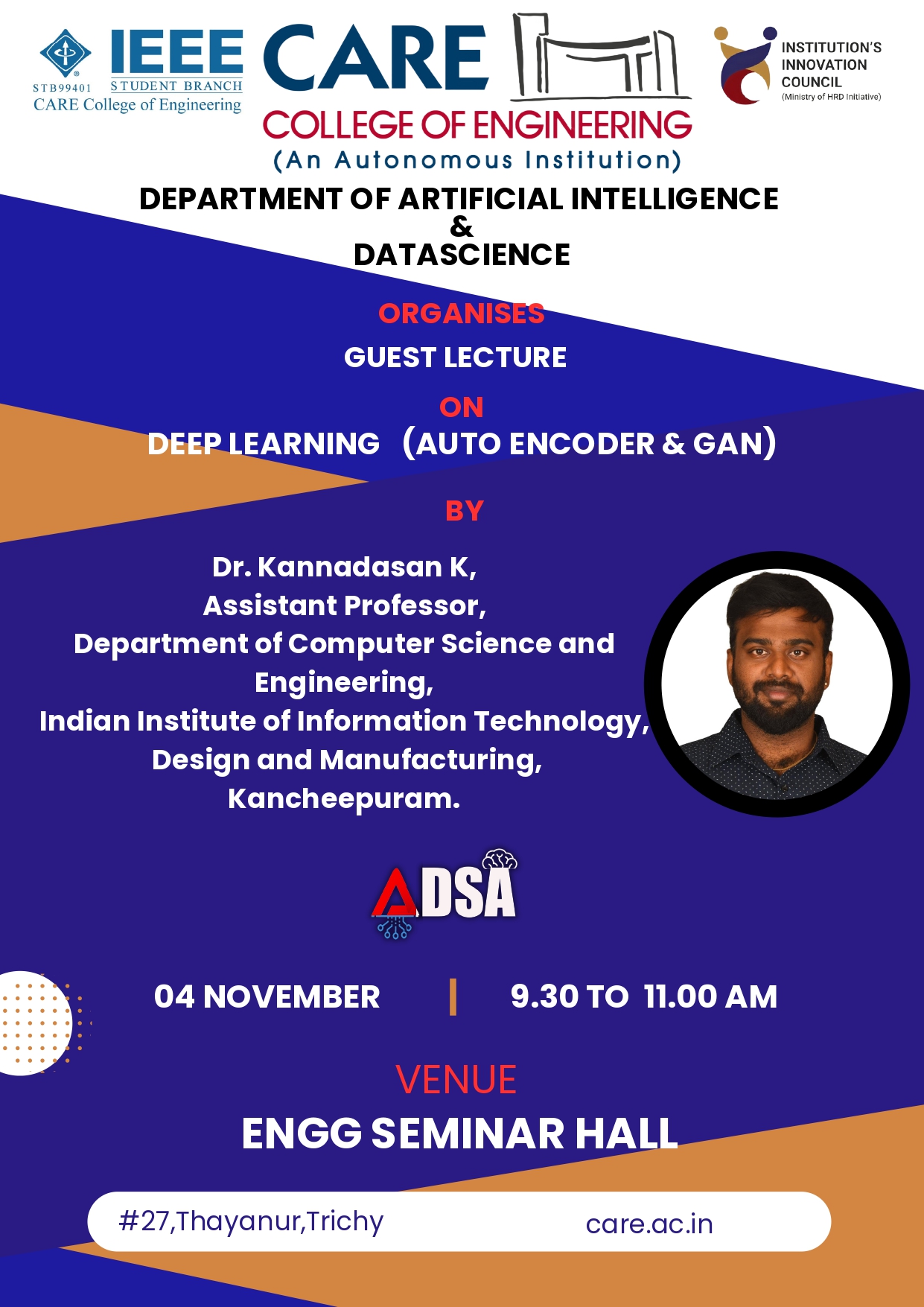
The session aimed to provide students with a deeper understanding of these advanced machine learning techniques, which are integral to the fields of data science and artificial intelligence.
Overview of the Session
Dr. K. Kannadasan began the lecture by introducing the core concepts of Autoencoders. He explained that autoencoders are a type of artificial neural network used to learn efficient coding of input data. These networks are unsupervised and are primarily used for dimensionality reduction, noise reduction, and data compression tasks. The professor broke down the architecture of an
autoencoder, explaining the roles of the encoder, latent space, and decoder. He also discussed various types of autoencoders, including variational autoencoders, and how they are applied in real- world scenarios, such as anomaly detection and image compression.
Following the discussion on autoencoders, Dr. Kannadasan shifted focus to Generative Adversarial Networks (GANs). He explained that GANs consist of two competing neural networks: the generator, which creates data samples, and the discriminator, which evaluates their authenticity.
The professor emphasized the innovative potential of GANs in generating realistic data, particularly in areas like image generation, style transfer, and synthetic data creation for training other AI models. The discussion also covered the key challenges in training GANs, such as mode collapse and instability during optimization.
Student Engagement
The session was highly interactive, with students actively participating by asking questions and discussing practical applications of these technologies. Dr. Kannadasan took the time to answer queries in detail, explaining complex topics with clarity and using real-world examples to illustrate the concepts effectively. This approach greatly helped the students in understanding the practical
implications of these algorithms.
Conclusion
The guest lecture provided valuable insights into two important deep learning techniques —Autoencoders and GANs. Dr. Kannadasan’s clear explanations, coupled with real-life applications, gave students a solid understanding of these advanced AI methods. The lecture was not only informative but also inspiring, encouraging students to explore these techniques further in their future academic and professional endeavors.
The AI & DS students expressed their gratitude to Dr. Kannadasan for taking the time to deliver such an enriching session, and it is hoped that such guest lectures will continue to foster a deeper understanding of emerging AI technologies.
COVERAGE OF PO’S AND PSO’S
PO1: Engineering Knowledge: Apply the knowledge of mathematics, science, engineering fundamentals, and an engineering specialization to the solution of complex engineering problems.
PO2: Problem Analysis: Identify, formulate, review research literature, and analyses complex engineering problems reaching substantiated conclusions using first principles of mathematics, natural sciences and engineering sciences.
PO3: Design / Development of Solution: Design solutions for complex engineering problems and design system components or processes that meet the specified needs with appropriate consideration for the public health and safety, and the cultural, societal, and environmental considerations.
PO4: Conduct investigations of complex problems: Use research-based knowledge and research methods including design of experiments, analysis and interpretation of data, and synthesis of the information to provide valid conclusions for complex problems.
PO5: Modern Tool Usage: Create, select, and apply appropriate techniques, resources, and modern engineering and IT tools including prediction and modelling to complex engineering activities with an understanding of the limitations.
PO6: The Engineer and Society: Apply reasoning informed by the contextual knowledge to assess societal, health, safety, legal and cultural issues and the consequent responsibilities relevant to the professional engineering practice.
PO12: Life-Long Learning: Recognize the need for, and have the preparation and ability to engage Recognize the need for, and have the preparation and ability to engage in independent and lifelong learning in the broadest context of technological change. 

